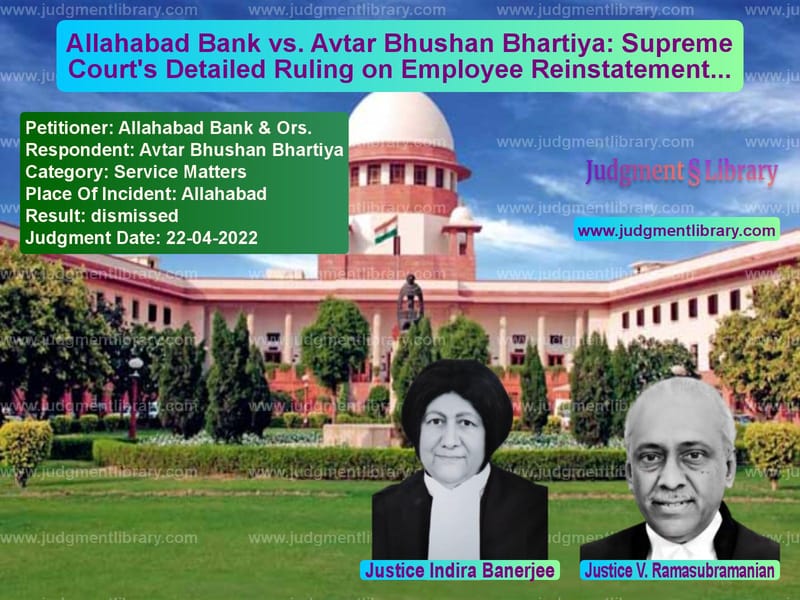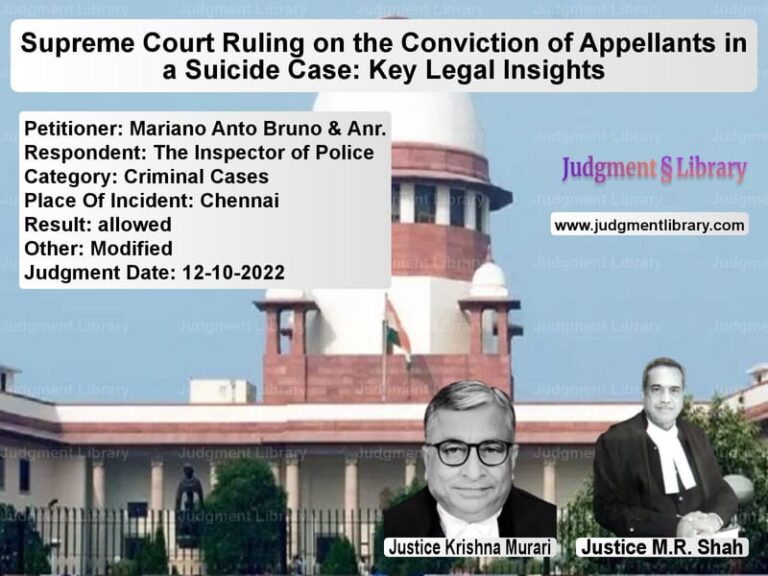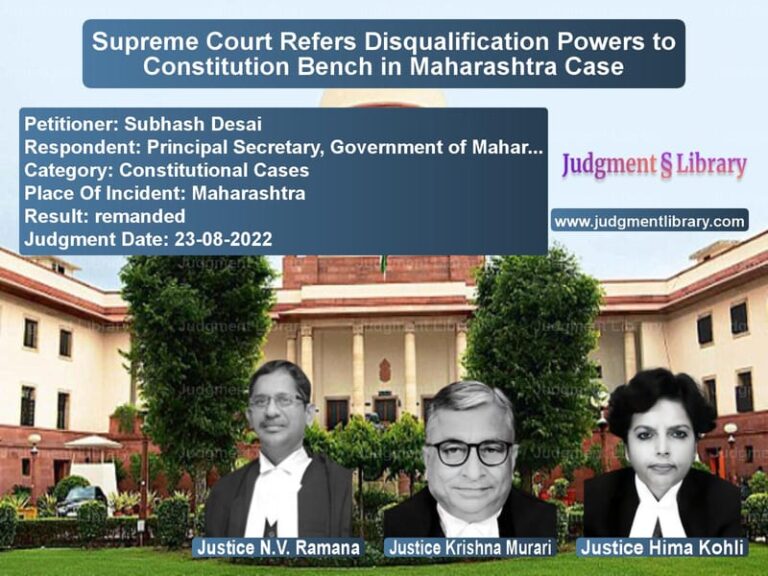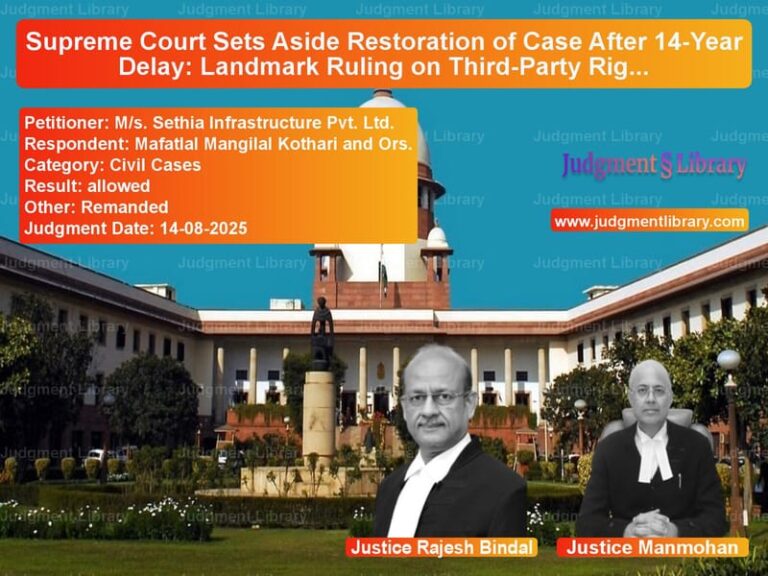Allahabad Bank vs. Avtar Bhushan Bhartiya: Supreme Court’s Detailed Ruling on Employee Reinstatement and Back Wages
The case of Allahabad Bank vs. Avtar Bhushan Bhartiya is a significant legal battle concerning the dismissal and reinstatement of an employee, addressing key principles of disciplinary procedures, due process, and back wages. The Supreme Court, in its detailed ruling, examined whether the dismissal was justified in the absence of procedural fairness and whether back wages should be awarded in full or partially.
This case highlights the fundamental rights of employees when facing disciplinary action and the obligations of employers to ensure procedural fairness. It also reaffirms the necessity of adhering to principles of natural justice in employment law, particularly in the banking sector, where procedural lapses can have severe consequences for both the employer and the employee.
Background of the Case
Avtar Bhushan Bhartiya was employed with Allahabad Bank as a Clerk in 1974. Over the years, he rose through the ranks to hold managerial positions. In 1988, he was accused of sanctioning loans and advances without conducting proper diligence. The bank initiated disciplinary proceedings against him, alleging that he had committed acts of gross misconduct. After conducting an internal inquiry, the disciplinary authority found him guilty and subsequently dismissed him from service in 1989.
Bhartiya challenged this dismissal, contending that the inquiry was conducted unfairly and that he was not provided with a copy of the inquiry report before the imposition of the penalty. He argued that this violated his fundamental right to a fair hearing, as he was deprived of an opportunity to respond to the findings against him.
High Court’s Ruling
The matter was taken up by the Allahabad High Court, which ruled in Bhartiya’s favor, directing his reinstatement along with 50% back wages and full retirement benefits. The High Court observed that the failure to provide a copy of the inquiry report to the employee before imposing the penalty amounted to a violation of the principles of natural justice.
The court held that due process must be followed in all disciplinary proceedings, especially in cases where the findings of the inquiry have a direct bearing on the penalty imposed. Since Bhartiya had been denied an opportunity to present his defense in response to the findings, his dismissal was deemed unlawful.
Appeal Before the Supreme Court
Allahabad Bank challenged the High Court’s ruling before the Supreme Court, arguing that the dismissal was based on a legally conducted inquiry and that reinstating Bhartiya would set a bad precedent. The bank contended that procedural lapses should not lead to the invalidation of the penalty, especially when the charges against the employee were serious in nature.
Bhartiya also filed an appeal, seeking full back wages instead of 50% as awarded by the High Court. He maintained that since his dismissal was unlawful, he was entitled to full compensation for the financial loss suffered during his dismissal period.
Supreme Court’s Observations
The Supreme Court examined whether Bhartiya was entitled to reinstatement, whether the dismissal was justified despite procedural lapses, and whether back wages should be awarded in full or partially.
Procedural Fairness
The Court reaffirmed that an employee facing disciplinary action has a fundamental right to a fair hearing. The failure to provide the inquiry report before imposing a penalty was a direct violation of this right. The Court emphasized that disciplinary proceedings must adhere to due process, and any violation of natural justice principles renders the dismissal invalid.
Reinstatement and Back Wages
Regarding reinstatement, the Supreme Court upheld the High Court’s decision, stating that Bhartiya’s dismissal was invalid due to procedural lapses. However, the Court observed that back wages should be awarded based on whether the employee was gainfully employed during the period of dismissal. Since there was no conclusive evidence that Bhartiya remained unemployed, the Court ruled that 50% back wages were appropriate.
Read also: https://judgmentlibrary.com/supreme-court-rules-on-guest-faculty-employment-rights-and-limitations/
Key Judicial Precedents
The Supreme Court referred to several precedents in employment law to reinforce its findings:
- State Bank of India vs. R.K. Jain: Emphasized that failure to provide an inquiry report before imposing penalties vitiates disciplinary proceedings.
- Union of India vs. Tulsiram Patel: Clarified that compliance with natural justice is mandatory in government and public sector employment matters.
- Canara Bank vs. V.K. Awasthy: Held that principles of natural justice are sacrosanct in employment disputes.
Final Verdict
The Supreme Court dismissed both appeals, upholding the High Court’s decision. The Court reiterated that procedural fairness cannot be compromised in disciplinary actions and that employees must be given an opportunity to present their defense against findings of misconduct. The ruling set a significant precedent in employment law, reinforcing the rights of employees in disciplinary proceedings.
Implications of the Judgment
This ruling has far-reaching implications for employment law and banking regulations. It underscores the importance of procedural fairness and due process in disciplinary actions, ensuring that employees are not arbitrarily dismissed without a fair opportunity to present their case.
For employers, this judgment serves as a reminder to adhere to established disciplinary procedures and ensure that employees are given access to all relevant documents before penalties are imposed. For employees, it reaffirms their right to a fair hearing and provides a legal basis to challenge unlawful dismissals.
Petitioner Name: Allahabad Bank & Ors..Respondent Name: Avtar Bhushan Bhartiya.Judgment By: Justice Indira Banerjee, Justice V. Ramasubramanian.Place Of Incident: Allahabad.Judgment Date: 22-04-2022.
Don’t miss out on the full details! Download the complete judgment in PDF format below and gain valuable insights instantly!
Download Judgment: allahabad-bank-&-ors-vs-avtar-bhushan-bharti-supreme-court-of-india-judgment-dated-22-04-2022.pdf
Directly Download Judgment: Directly download this Judgment
See all petitions in Employment Disputes
See all petitions in Disciplinary Proceedings
See all petitions in Pension and Gratuity
See all petitions in Termination Cases
See all petitions in Public Sector Employees
See all petitions in Judgment by Indira Banerjee
See all petitions in Judgment by V. Ramasubramanian
See all petitions in dismissed
See all petitions in supreme court of India judgments April 2022
See all petitions in 2022 judgments
See all posts in Service Matters Category
See all allowed petitions in Service Matters Category
See all Dismissed petitions in Service Matters Category
See all partially allowed petitions in Service Matters Category







